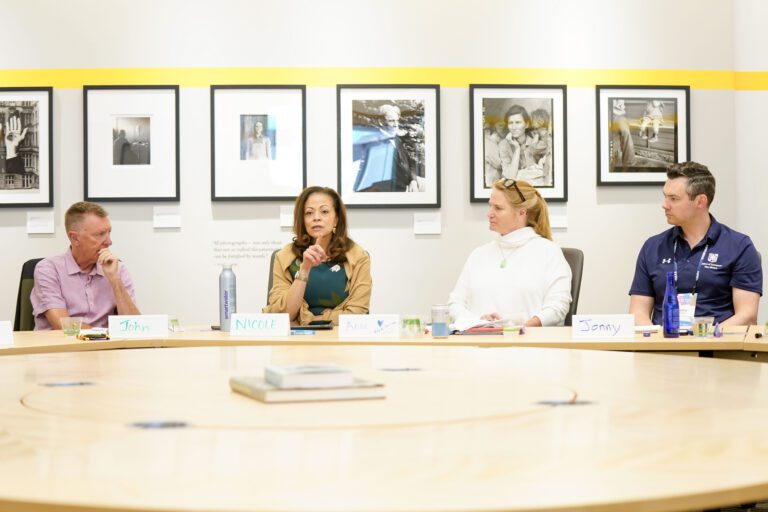Supporting Fathers to Build Community Resilience
We began the Fatherhood panel by breathing. I closed my eyes and focused solely on the flow of my breath through my body. In, out, in, out. My mind centered on the present moment, ready to dive into a topic rooted deeply in the hearts of every person in the room.
The breathing exercise led by one of the panelists, Travis Spencer, Founder and Mindfulness Instructor at Life Sangha, may have seemed out of place – better suited for a meditation retreat than a conference on community resilience. But those short moments of magic laid the ground for an inspiring and authentic conversation around the importance of fatherhood.
Curated by Wendy Ellis, Ascend Fellow, GW Scholar and Founding Director of the Building Community Resilience Collaborative and Networks, the meeting, part of the Building Community Resilience Spring Meeting, brought together innovators and leaders from across the country to engage in dialogue around the “pair of ACEs” – Adverse Childhood Experiences and Adverse Community Environments.
The session, “Fatherhood,” moderated by Ascend’s Assistant Director for Network and Outreach, Sarah Haight, featured innovation and research changing the landscape of supports for fathers and families across the country, including
- Joe Jones, Founder and CEO of the Center for Urban Families (CFUF), a Baltimore based organization that aims to strengthen urban communities by helping fathers and their families achieve economic stability and success.
- Clinton Boyd, doctoral candidate at Georgia State University, where he is pioneering new models of home visiting for marginalized fathers in Atlanta.
- Matt Biel, clinical psychiatrist at Georgetown University Medical Center; associate professor at Georgetown University School of Medicine and co-founder of the Early Childhood Innovation Network (ECIN), a community of practitioners, researchers, and advocates connecting health and education for young children across Washington, DC.
- Travis Spencer, founder of Life Sangha, the mindfulness arm of the Early Childhood Innovation Network.
At the heart of the work shared was the concept Joe Jones calls “Responsible Fatherhood.” Each of the speakers noted that the fathers they encounter are deeply committed to supporting themselves and their kids. However, systemic barriers and lack of community education often present challenges to their ability to do so. The goal is to open doors for all fathers striving to be good dads through innovative programming, trauma-informed approaches, and revitalization – and in some case, reform of public policy.
Lessons Learned
- The Center for Urban Families: The effects of mass incarceration and consumer debt plague many neighborhoods, families, and communities of color. The areas of Baltimore served by the Center for Urban Families include the three zip codes in the city with the highest rates of reentry. The residents in these neighborhoods owe over $26 million dollars in child support debt. Such financial burdens often cause government institutions and social service agencies to label men as “deadbeats”, when in fact they are often “dead broke”, stuck in cycles of debt, underemployment, and justice system involvement that is difficult to escape. In order to expand opportunities for these individuals to support their children, CFUF worked with the Maryland state legislature to expand the STEP UP pilot that gives fathers owing child support money the chance to participate in a workforce development program designed to increase their chances of employment and eliminates debt.
- Early Childhood Innovation Network: Individual and communal trauma are central to the BCR movement and evident across fatherhood programs. As Dr. Biel noted, when approaching the families interacting with these programs and systems, it is best to presume trauma. The evidence from Life Sangha shows that four months of mindful group therapy has decreased anxiety and depression while increasing sleep, self-efficacy, and social capital of parents.
- Dads 2 Kids Program: Adapted from SafeCare, a home-visiting program largely targeted towards mothers with a history of child maltreatment, serves marginalized fathers in the Atlanta region. It prioritizes fathers’ experiences in order to meet them where they are and strengthen parent-child interactions. Mr. Boyd shared personal voice messages of the fathers in his Dads 2 Kids program who shared heartfelt appreciation for their ability to connect with and provide for their children.
How does equity factor into these practices? Significantly. The speakers spoke explicitly about the policies and institutions that have historically oppressed fathers and families of color. Bright spots like the second Bush administration’s Fatherhood memorandum opened doors for fathers across the US to be more supported in their engagement with their children. Nonetheless, funding for such programs did not erase the racial and gender inequities that have influenced the cultural and political narratives that shape these fathers’ lives. The Crime Bill of 1994 and the Quality Housing and Work Responsibility Act of 1998, among other public policies, deepened systemic inequity. Each panelist spoke to the importance of creating space to talk about racism and inequality in order to heal our past and create a better future.
Joe, Clint, Matt, and Travis bring unique perspective and deep expertise to their work. As the panel came to a close, it felt like the end of a meditation session. The audience left refreshed, centered, and committed to carrying justice for fathers and families forward.
BCR is a national movement based at The George Washington University Milken Institute School of Public Health. The national based in five regions across the country foster resilience against the stressors that can become toxic to a child’s development and long-term health by addressing systemic barriers faced by families and communities. As their work has evolved, they have developed tools, resources and messaging that help to foster understanding about the relationship between trauma, equity and resilience. To learn more about the movement go to go.gwu.edu/BCR.
Watch the full panel discussion from the BCR national meeting here.
Hallie Young is a program associate at Ascend at the Aspen Institute.
Related Posts



